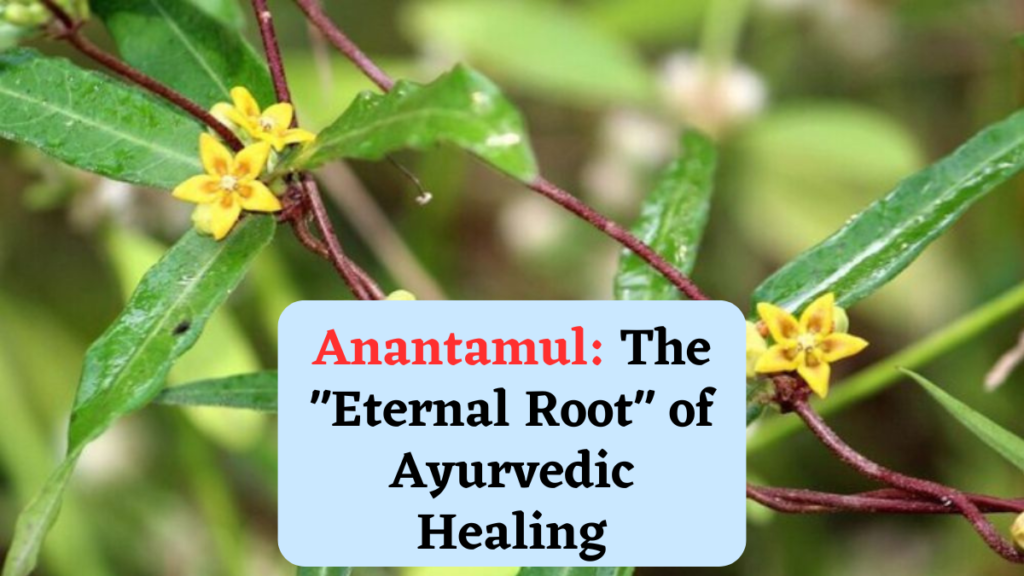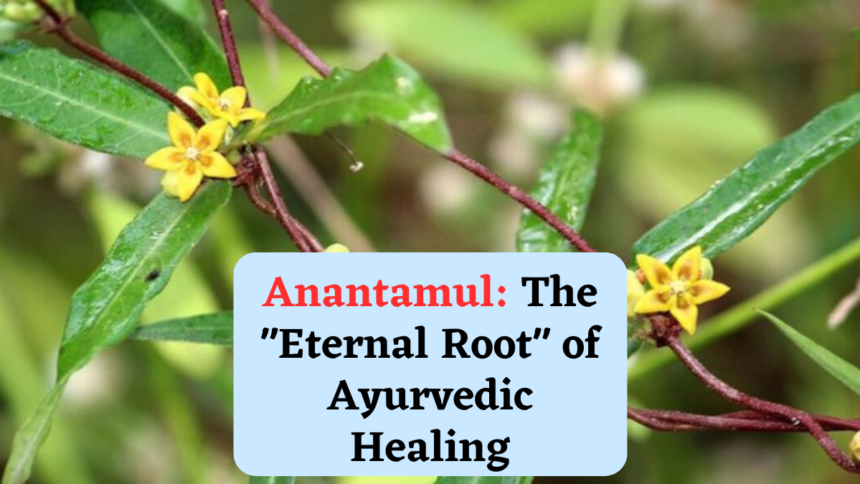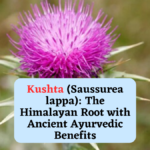Anantamul: The “Eternal Root” of Ayurvedic Healing
Introduction
In the treasure trove of Ayurvedic herbs, Anantamul (Hemidesmus indicus) holds a special place. Its name itself translates to “eternal root,” hinting at its enduring role in traditional Indian medicine. Anantamul is a climbing vine with a long history of use for various ailments. Anantamul: The “Eternal Root” of Ayurvedic Healing. But what exactly makes this herb so special in Ayurveda?

Ayurvedic Properties of Anantamul
Ayurveda categorizes everything in the universe based on three doshas: Vata, Pitta, and Kapha. Anantamul is considered particularly beneficial for balancing Pitta dosha, which is associated with fire and heat elements in the body. When Pitta is imbalanced, it can manifest as skin problems, digestive issues, and irritability.
Anantamul’s key properties in Ayurveda include:
- Ropan (Healing): It promotes tissue repair and wound healing.
- Raktashodhak (Blood Purifying): It helps eliminate toxins from the blood, contributing to a clearer complexion and overall well-being.
- Sheeta (Cooling): It has a cooling effect, counteracting the fiery nature of Pitta dosha.
Benefits of Anantamul in Ayurveda
Traditionally, Anantamul has been used in Ayurveda to address a wide range of concerns:
- Skin Health: Due to its blood purifying and healing properties, Anantamul is a popular choice for treating various skin conditions like eczema, psoriasis, and ringworm. It can be used both internally (as a decoction or powder) and externally (as a paste).
- Digestive Issues: Anantamul’s cooling effect can help soothe digestive problems like diarrhea and dysentery.
- Urinary Tract Health: Its diuretic properties may aid in flushing out toxins and preventing urinary tract infections.
- Fevers: Anantamul’s cooling properties can be helpful in reducing fevers associated with Pitta imbalance.
How to Use Anantamul
Anantamul is typically available in powder or root form. Consult with an Ayurvedic practitioner to determine the appropriate dosage and method of use based on your specific needs. Experts generally recommend avoiding self-medication, especially for pregnant or lactating women.
The Final Word
Anantamul is a versatile herb with a rich history in Ayurveda. Its blood purifying, healing, and cooling properties make it a valuable tool for addressing various Pitta-related concerns. If you’re looking for natural ways to support your skin health, digestion, or overall well-being, consider consulting an Ayurvedic practitioner to explore the potential benefits of Anantamul.
Anantamul (Hemidesmus indicus) in Ayurveda: FAQs
What is Anantamul?
Anantamul, also known as Indian Sarsaparilla, is a climbing vine with a long history of use in Ayurveda. Its name translates to “eternal root,” reflecting its status as a valuable medicinal herb.
What are the Ayurvedic properties of Anantamul?
People consider Anantamul beneficial for balancing Pitta dosha (fire and heat elements) in the body. Its key properties include:
- Ropan (Healing): Promotes tissue repair and wound healing.
- Raktashodhak (Blood Purifying): Helps eliminate toxins from the blood.
- Sheeta (Cooling): Counteracts the fiery nature of Pitta dosha.
What are the benefits of Anantamul in Ayurveda?
Anantamul is used for various concerns, including:
- Skin health (eczema, psoriasis, ringworm)
- Digestive issues (diarrhoea, dysentery)
- Urinary tract health
- Fevers (associated with Pitta imbalance)
How is Anantamul used?
Anantamul is typically available in powder or root form. Consult an Ayurvedic practitioner for proper dosage and method of use based on your needs. Experts generally advise avoiding self-medication, especially for pregnant or lactating women.
Are there any side effects of Anantamul?
While generally safe, it’s best to consult a healthcare professional before using Anantamul, especially if you have any underlying health conditions or are taking medications.
Where can I learn more about Anantamul?
Speak with a qualified Ayurvedic practitioner for personalized advice on using Anantamul. You can also find general information from reliable online sources on Ayurveda. Remember, this information is not a substitute for professional medical advice.











